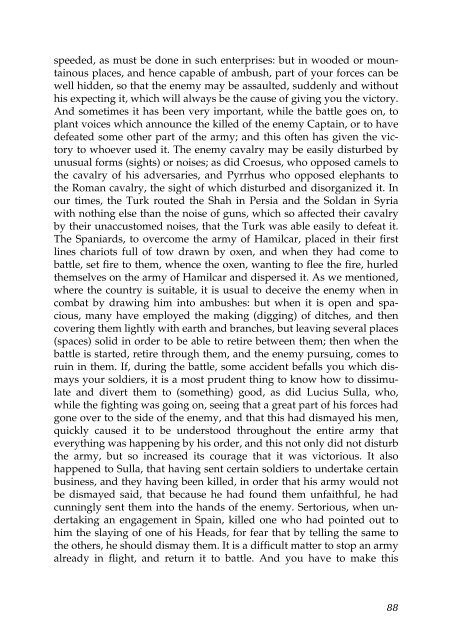You also want an ePaper? Increase the reach of your titles
YUMPU automatically turns print PDFs into web optimized ePapers that Google loves.
speeded, as must be done in such enterprises: but in wooded or mountainous<br />
places, and hence capable <strong>of</strong> ambush, part <strong>of</strong> your forces can be<br />
well hidden, so that the enemy may be assaulted, suddenly and without<br />
his expecting it, which will always be the cause <strong>of</strong> giving you the victory.<br />
And sometimes it has been very important, while the battle goes on, to<br />
plant voices which announce the killed <strong>of</strong> the enemy Captain, or to have<br />
defeated some other part <strong>of</strong> the army; and this <strong>of</strong>ten has given the victory<br />
to whoever used it. <strong>The</strong> enemy cavalry may be easily disturbed by<br />
unusual forms (sights) or noises; as did Croesus, who opposed camels to<br />
the cavalry <strong>of</strong> his adversaries, and Pyrrhus who opposed elephants to<br />
the Roman cavalry, the sight <strong>of</strong> which disturbed and disorganized it. In<br />
our times, the Turk routed the Shah in Persia and the Soldan in Syria<br />
with nothing else than the noise <strong>of</strong> guns, which so affected their cavalry<br />
by their unaccustomed noises, that the Turk was able easily to defeat it.<br />
<strong>The</strong> Spaniards, to overcome the army <strong>of</strong> Hamilcar, placed in their first<br />
lines chariots full <strong>of</strong> tow drawn by oxen, and when they had come to<br />
battle, set fire to them, whence the oxen, wanting to flee the fire, hurled<br />
themselves on the army <strong>of</strong> Hamilcar and dispersed it. As we mentioned,<br />
where the country is suitable, it is usual to deceive the enemy when in<br />
combat by drawing him into ambushes: but when it is open and spacious,<br />
many have employed the making (digging) <strong>of</strong> ditches, and then<br />
covering them lightly with earth and branches, but leaving several places<br />
(spaces) solid in order to be able to retire between them; then when the<br />
battle is started, retire through them, and the enemy pursuing, comes to<br />
ruin in them. If, during the battle, some accident befalls you which dismays<br />
your soldiers, it is a most prudent thing to know how to dissimulate<br />
and divert them to (something) good, as did Lucius Sulla, who,<br />
while the fighting was going on, seeing that a great part <strong>of</strong> his forces had<br />
gone over to the side <strong>of</strong> the enemy, and that this had dismayed his men,<br />
quickly caused it to be understood throughout the entire army that<br />
everything was happening by his order, and this not only did not disturb<br />
the army, but so increased its courage that it was victorious. It also<br />
happened to Sulla, that having sent certain soldiers to undertake certain<br />
business, and they having been killed, in order that his army would not<br />
be dismayed said, that because he had found them unfaithful, he had<br />
cunningly sent them into the hands <strong>of</strong> the enemy. Sertorious, when undertaking<br />
an engagement in Spain, killed one who had pointed out to<br />
him the slaying <strong>of</strong> one <strong>of</strong> his Heads, for fear that by telling the same to<br />
the others, he should dismay them. It is a difficult matter to stop an army<br />
already in flight, and return it to battle. And you have to make this<br />
88
















